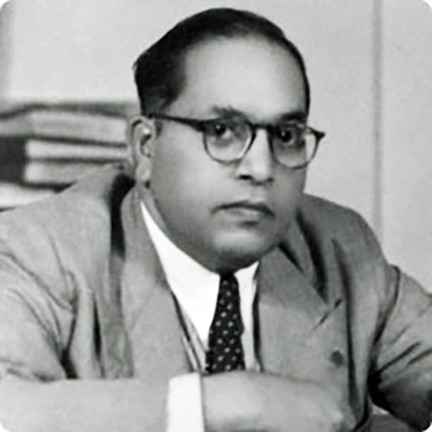Don’t Invoke Babasaheb Ambedkar Selectively
Why in the News?
- Recent comments by Home Minister Amit Shah about a “misplaced search for god” by Ambedkar’s supporters have reignited discussions on the persistence of the caste system in modern India.
- These remarks have sparked debates on whether they undermine decades of activism against caste-based discrimination.
- B.R. Ambedkar’s ideas and vision continue to be highly relevant, offering insights not just for Dalits but for the nation as a whole.
- Selective adoption of Ambedkar’s principles and inadequate focus on issues concerning marginalized groups weaken the essence of his mission.
- The practice of deifying Ambedkar is rooted in his immense contribution to social change and empowering the Dalit community.
Ambedkar and the Legacy of Dalit Empowerment
Ambedkar’s Struggle and Congress Politics
- Jawaharlal Nehru’s assertion that reservations would “promote inefficiency and mediocracy” possibly contributed to sidelining Ambedkar in post-independence politics.
- Ambedkar’s resignation from the Cabinet may reflect his feelings of neglect and his role as a voice for Dalits and women.
- The Congress historically resisted affirmative action, from the Constituent Assembly debates to the Mandal Commission recommendations.
- For decades, the Congress approached Dalits from a class perspective, viewing them as part of the “gareeb janta,” ignoring the complexities of caste-based discrimination.
Modern-Day Political Controversy
- The Parliament’s debates over Ambedkar’s legacy highlight the superficiality of caste discourse among dominant caste politicians.
- Despite lofty rhetoric, caste-based discrimination remains systemic, evidenced by ongoing incidents like violence against Dalits.
- The INDIA bloc’s intensity in raising Dalit issues contrasts with its lack of genuine understanding of marginalized groups’ struggles.
Dalits’ Fight: Beyond Identity
- Dalits are not battling an identity crisis; their struggle centers on dignity, recognition, opportunity, and equality.
- From Ambedkar to leaders like Kanshi Ram, Mayawati, and Ram Vilas Paswan, the Dalit movement has been grounded in a legacy of resilience and aspirations.
- Appeasement politics over decades kept Dalits at a marginal level of deprivation, providing some benefits while suppressing their aspirations for equality.
Progress Under Recent Regimes
- Prime Minister Narendra Modi’s initiatives, such as the Nari Shakti Vandan Adhiniyam and panch teerth sites, have aimed to elevate Dalit dignity and discourse.
- The BJP has demonstrated unprecedented inclusion of Dalit leaders at the national level.
Ambedkar’s Vision: A Universal Relevance
- Ambedkar’s ideas go beyond Dalits, offering solutions to discrimination and inequality for all marginalized groups.
- The focus has shifted from survival to aspirations for equal opportunity and representation in governance and administration.
- True reverence for Ambedkar lies in embracing his vision for the nation, not merely chanting his name or invoking his image.
Dalit Pantheon and the Caste Debate
The Dalit Pantheon: A Hard-Fought Identity
- Unlike caste Hindus, who revere 33 crore gods, Dalits have a limited but deeply meaningful pantheon.
- This exclusivity stems from centuries of exclusion and dispossession, where temple doors were closed on Dalits.
- Dalit gods are often historical and earthly figures, celebrated for their struggles and merit rather than divine myths.
- The hallmark of modern Indian society is a social compact that demands mutual respect between Dalits and caste Hindus — free from mockery, patronization, or religious arrogance.
Amit Shah’s Controversial Remarks
- The Home Minister’s comments on Ambedkar’s followers searching for god are regrettable and breach this social compact.
- These remarks, followed by political counterattacks, have triggered an intense debate but reflect deeper systemic issues.
- The underlying mindset enabling such comments highlights persistent caste prejudices.
Historical Context of Exclusion
- Ancient India’s joint sovereignty between kings and deities enforced an exclusionary social order with divine and administrative sanction.
- Dalits were coerced into this system without being allowed “darshan” or participation in sacred rituals.
- The search for alternate gods began with figures like the 16th-century cobbler-mystic Ravidas, whose verses challenged caste orthodoxy.
- Ravidas and other icons gained prominence, particularly in the 20th century, as symbols of Dalit self-affirmation.
Ambedkar and the Politics of Divination
- Icons like B.R. Ambedkar and Jagjivan Ram emerged as political and social justice champions.
- Ambedkar’s achievements, especially drafting the Constitution, earned him a divine pedestal in Dalit consciousness.
- Dalit worship of these icons is more than symbolic; it represents a form of ritualistic insurgency aimed at subverting social hierarchies and compelling equity.
Challenges to Dalit Empowerment
- The worship of Dalit icons disrupts the traditional divination tied to caste hierarchies, threatening the status quo.
- Remarks undermining these icons reflect ongoing attempts to dilute their significance and dehistoricize their contributions.
The Central Issue: The Caste System
- The debate on Ambedkar’s legacy underscores the persistence of caste discrimination in modern India.
- Caste remains the most significant betrayal of human equality and dignity, continuing to impede true social progress.
Way forward
- Promote Social Awareness: Encourage campaigns and educational programs to challenge caste-based prejudices and foster mutual respect across communities.
- Strengthen Legal Protections: Enforce anti-discrimination laws and provide stringent punishments for caste-based violence and inequity.
- Empower Marginalized Communities: Expand access to education, healthcare, and employment opportunities for Dalits and other marginalized groups.
- Celebrate Dalit Icons Inclusively: Recognize and honor contributions of Dalit leaders like Ambedkar at national and local levels to inspire collective pride.
- Foster Dialogue: Facilitate open discussions between communities to address grievances and build trust.
- Ensure Political Accountability: Urge political leaders to refrain from divisive rhetoric and focus on policies for social justice.
- Representation Matters: Increase Dalit representation in governance, academia, and decision-making bodies to ensure inclusivity.
- Strengthen Grassroots Movements: Support local initiatives that advocate for equity and dignity within marginalized communities.
Associated articles
https://universalinstitutions.com/ambedkars-legacy-the-forgotten-hindu-code-bill/
https://universalinstitutions.com/the-ambedkar-touch-in-rethinking-social-justice-policies/
Mains question
Discuss the historical exclusion of Dalits from religious and social systems in India and evaluate the role of Ambedkar in shaping modern Dalit identity and empowerment. (250 words)






